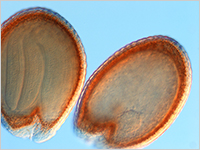Enlarge Image
Key genes in epidermal cell differentiation are essential for survival of plants
The bodies of plants consist of only three tissue systems: the outermost epidermal tissue, the inner tissue, and the vascular tissue. The epidermis plays an important role in protecting the body of a plant from external stresses, preventing organ fusions, and determining final organ shapes.
In a model plant, Arabidopsis, a pair of genes, ATML1 and PDF2, has been identified to serve as a key factor involved in the formation of the epidermis. However, the functional importance of these two genes reamins to be fully understood.
Now, Taku Takahashi and his colleagues at Okayama University in collaboration with a group at the University of Tokyo have provided compeling evidence that ATML1 and PDF2 are essential for the growth of embryos in Arabidopsis.
They generated the double loss-of-function mutant of ATML1 and PDF2 and found that the complete loss of these two genes resulted in the embryonic arrest before seed germination.
They confirmed that the inhibition of the expression of ATML1 and PDF2 caused a severe defect in epidermis formation and organ fusions in leaves, stems and flowers.
The results provide significant clues to the understanding of how the identity of epidermal cells is established in the plant embryo and to further studies on how plant bodies are formed.
Reference:
・ Authors: Eriko Ogawa, Yusuke Yamada, Noriko Sezaki, Sho Kosaka, Hitoshi Kondo, Naoko Kamata, Mitsutomo Abe, Yoshibumi Komeda, and Taku Takahashi.
・ Title of original paper: ATML1 and PDF2 Play a Redundant and Essential Role in Arabidopsis Embryo Development.
・ Journal, volume, pages and year: Plant and Cell Physiology 56, 1183-1192 (2015).
・ Digital Object Identifier (DOI): 10.1093/pcp/pcv045
・ Journal website: http://pcp.oxfordjournals.org/content/56/6/1183.long
・ Affiliations: Division of Bioscience, Graduate School of Natural Science and Technology, Okayama University.
・ Department website: http://www.biol.okayama-u.ac.jp/news/news_id4716.html

